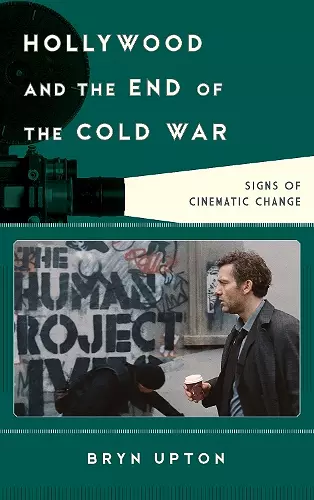Hollywood and the End of the Cold War
Signs of Cinematic Change
Format:Hardback
Publisher:Bloomsbury Publishing PLC
Published:26th Aug '14
Currently unavailable, and unfortunately no date known when it will be back

From the late 1940s until the early 1990s, the Cold War was perhaps the most critical and defining aspect of American culture, influencing television, music, and movies, among other forms of popular entertainment. Films in particular were at the center of the battle for the hearts and minds of the American public. Throughout this period, the Cold War influenced what movies got produced, how such movies were made, and how audiences understood the films they watched. In the post–Cold War era, some genres of film suffered from the shift in our national narratives, while others were quickly reimagined for an audience with different political and social fears.
In Hollywood and the End of the Cold War: Signs of Cinematic Change, Bryn Upton compares films from the late Cold War era with movies of similar themes from the post–Cold War era. In this volume, Upton pays particular attention to shifts in narrative that reflect changes in American culture, attitudes, and ideas. In exploring how the absence of the Cold War has changed the way we understand and interpret film, this volume seeks to answer several key questions such as: Has the end of the Cold War altered how we tell our stories? Has it changed how we perceive ourselves? In what ways has our popular culture been affected by the absence of this once dominant presence?
With its focus on themes that are central to the concerns of many historians—including civil religion, social fracture, and the culture wars—Hollywood and the End of the Cold War will serve as a useful tool for those seeking to integrate film into the classroom, as well as for film scholars exploring representations of sociopolitical change on screen.
The lion’s share of scholarship about Hollywood and the Cold War has been paid to the 'blacklist' and the influence of McCarthyism. Upton shifts focus forward in time to the end of the Cold War, analyzing how the relatively sudden disappearance of the adversarial geopolitics of the Cold War affected the thematic, symbolic, and rhetorical content of Hollywood films. Each of Upton’s nine chapters examines a fairly popular genre of movie--e.g., the superhero film, the spy thriller, the coming-of-age story--and looks at how exemplars within that genre evolved from the Cold War’s second peak during the Reagan era through the two decades following its end. . . .Upton’s writing is insightful and accessible. . . .This is a valuable. . . .introductory source. Summing Up: Recommended. . . .Lower- and upper-division undergraduates; graduates students; general readers. * Choice Reviews *
While the Cold War ended in 1991 with a whimper, not a bang, it still affects popular culture in many ways. In his book. Hollywood and the End of the Cold War: Signs of Cinematic Change, Bryn Upton discusses how filmmakers used many of the same Cold War themes in new ways. . . .In addition to providing the background of the Cold War and how it was represented in films of the period, Bryn Upton describes the period since the fall of the Soviet Union and how movies deal with many of the same issues. He talks about how films deal with good versus evil, how espionage is portrayed with different enemies, as well as the changing identities of different groups. He also makes sure to review the concept of nuclear holocaust, one of the major Cold War film themes, and how newer films still use it as a plot point. Upton gives a great overview of modern film and what the movies took from the ideas developed during that turbulent period. * New Books Network *
ISBN: 9781442237933
Dimensions: 236mm x 163mm x 20mm
Weight: 445g
208 pages